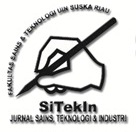Optimization Of Integrated Material Procurement Processes In The Vendor Managed Inventory (VMI) System
Abstract
This study aims to address challenges in the material procurement process within the steel fabrication industry, which currently relies on a manual, Excel-based system. Such a system is prone to data errors, delivery delays, and ineffective interdepartmental communication. The research employs a case study approach, incorporating direct observations, historical data analysis, and interviews with relevant stakeholders. The proposed solution is an integrated Vendor Managed Inventory (VMI) system, developed using the Waterfall model through stages ranging from requirements definition to system testing. Findings reveal that implementing the VMI system significantly enhances efficiency, transparency, and the speed of material procurement while improving collaboration between the company and its suppliers. Additionally, the system optimizes inventory management, reduces operational risks, and offers a scalable solution for various manufacturing sectors. In conclusion, the integrated VMI system contributes substantially to improving overall supply chain performance.
Keywords: Efficiency, Integration, Inventory Management, Procurement, VMI System
Full Text:
PDFReferences
A. K. Sahu, R. K. Padhy, D. Das, and A. Gautam, “Improving financial and environmental performance through MFCA: A SME case study,” J Clean Prod, vol. 279, p. 123751, Jan. 2021, doi: 10.1016/j.jclepro.2020.123751.
O. Karabağ and B. Gökgür, “Integrated optimisation of pricing, manufacturing, and procurement decisions of a make-to-stock system operating in a fluctuating environment,” Int J Prod Res, vol. 61, no. 24, pp. 8423–8450, Dec. 2023, doi: 10.1080/00207543.2022.2152127.
E. Chinello, Z. N. Lee Herbert-Hansen, and W. Khalid, “Assessment of the impact of inventory optimization drivers in a multi-echelon supply chain: Case of a toy manufacturer,” Comput Ind Eng, vol. 141, p. 106232, Mar. 2020, doi: 10.1016/j.cie.2019.106232.
W. Sun, Q. Wang, Y. Zhou, and J. Wu, “Material and energy flows of the iron and steel industry: Status quo, challenges and perspectives,” Appl Energy, vol. 268, p. 114946, Jun. 2020, doi: 10.1016/j.apenergy.2020.114946.
S. Tripathi and M. Gupta, “A framework for procurement process re-engineering in Industry 4.0,” Business Process Management Journal, vol. 27, no. 2, pp. 439–458, Dec. 2020, doi: 10.1108/BPMJ-07-2020-0321.
Z. Cui, D. Z. Long, J. Qi, and L. Zhang, “The Inventory Routing Problem Under Uncertainty,” Oper Res, vol. 71, no. 1, pp. 378–395, Jan. 2023, doi: 10.1287/opre.2022.2407.
E. Piva, L. Tebaldi, G. Vignali, and E. Bottani, “Simulation of different reordering policies for optimizing the inventory of perishable food: an Italian case study,” International Journal of Food Engineering, vol. 18, no. 3, pp. 201–238, Mar. 2022, doi: 10.1515/ijfe-2021-0047.
A. T. W. Yu, S. K. Yevu, and G. Nani, “Towards an integration framework for promoting electronic procurement and sustainable procurement in the construction industry: A systematic literature review,” J Clean Prod, vol. 250, p. 119493, Mar. 2020, doi: 10.1016/j.jclepro.2019.119493.
C. Alejandrino, I. Mercante, and M. D. Bovea, “Life cycle sustainability assessment: Lessons learned from case studies,” Environ Impact Assess Rev, vol. 87, p. 106517, Mar. 2021, doi: 10.1016/j.eiar.2020.106517.
H. Kaur, S. P. Singh, J. A. Garza-Reyes, and N. Mishra, “Sustainable stochastic production and procurement problem for resilient supply chain,” Comput Ind Eng, vol. 139, p. 105560, Jan. 2020, doi: 10.1016/j.cie.2018.12.007.
U. Schmelzle and P. S. Mukandwal, “The impact of supply chain relationship configurations on supplier performance: investigating buyer–supplier relations in the aerospace industry,” The International Journal of Logistics Management, vol. 34, no. 5, pp. 1301–1321, Aug. 2023, doi: 10.1108/IJLM-12-2020-0465.
A. A. Taleizadeh, I. Shokr, I. Konstantaras, and M. VafaeiNejad, “Stock replenishment policies for a vendor-managed inventory in a retailing system,” Journal of Retailing and Consumer Services, vol. 55, p. 102137, Jul. 2020, doi: 10.1016/j.jretconser.2020.102137.
T. Song, Q. Zhang, J. Ran, and W. Ran, “Research on Supplier Collaboration of Daily Consumer Goods under Uncertainty of Supply and Demand,” Sustainability, vol. 13, no. 10, p. 5683, May 2021, doi: 10.3390/su13105683.
A. Saravanos and M. X. Curinga, “Simulating the Software Development Lifecycle: The Waterfall Model,” Aug. 2023, doi: 10.3390/asi6060108.
D. Lantara, A. Pawennari, A. Padhil, R. Malik, I. N. Afiah, and A. Cahya, “DESIGN INFORMATION SYSTEMS OF PRODUCTION RESULTS IN THE RAJAWALI BROMO CONVECTION INDUSTRY, MAKASSAR,” Journal of Industrial Engineering Management, vol. 6, no. 1, pp. 57–62, May 2021, doi: 10.33536/jiem.v6i1.885.
S. Iqbal, I. Al-Azzoni, G. Allen, and H. Ullah Khan, “Extending UML Use Case Diagrams to Represent Non-Interactive Functional Requirements,” e-Informatica Software Engineering Journal, vol. 14, no. 1, 2020, doi: 10.37190/e-Inf200104.
K. Hapsari and Y. Priyadi, “Perancangan Model Data Flow Diagram Untuk Mengukur Kualitas Website Menggunakan Webqual 4.0,” JURNAL SISTEM INFORMASI BISNIS, vol. 7, no. 1, p. 66, May 2017, doi: 10.21456/vol7iss1pp66-72.
H. Alshareef, K. Tuma, S. Stucki, G. Schneider, and R. Scandariato, “Precise Analysis of Purpose Limitation in Data Flow Diagrams,” in Proceedings of the 17th International Conference on Availability, Reliability and Security, New York, NY, USA: ACM, Aug. 2022, pp. 1–11. doi: 10.1145/3538969.3539010.
G. S. Mahendra and I. K. A. Asmarajaya, “Evaluation Using Black Box Testing and System Usability Scale in the Kidung Sekar Madya Application,” Sinkron, vol. 7, no. 4, pp. 2292–2302, Oct. 2022, doi: 10.33395/sinkron.v7i4.11755.
DOI: http://dx.doi.org/10.24014/sitekin.v22i2.34627
Refbacks
- There are currently no refbacks.
Copyright (c) 2025 SITEKIN: Jurnal Sains, Teknologi dan Industri
 | Editorial Address: FAKULTAS SAINS DAN TEKNOLOGI UIN SULTAN SYARIF KASIM RIAU Kampus Raja Ali Haji Gedung Fakultas Sains & Teknologi UIN Suska Riau Jl.H.R.Soebrantas No.155 KM 18 Simpang Baru Panam, Pekanbaru 28293 © 2023 SITEKIN, ISSN 2407-0939 |
SITEKIN Journal Indexing:
Google Scholar | Garuda | Moraref | IndexCopernicus | SINTA

SITEKIN by http://ejournal.uin-suska.ac.id/index.php

.png)





